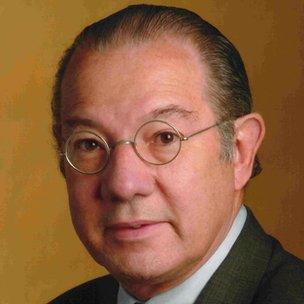Viewpoint: Brazil - steady growth for America's only Bric
- Published

Ambassador Barbosa: Brazil is not a reactive country anymore
Over the past 10 years, Brazil has been through deep transformations.
Their origins can be traced to the country's modernization in the 1990s, as a result of a successful privatisation program, of the stabilisation of the economy and the strengthening of the banking system.
Regarding the economy, the administration by Luiz Inacio Lula da Silva (who used to oppose his predecessor, Fernando Henrique Cardoso) kept the main economic policies in place: fiscal austerity, inflation targets and a fluctuating exchange rate.
As a result, the risks of investing in Brazil decreased significantly, economic growth rates went up, inflation rates retreated to levels similar to other countries around the world, and Foreign Direct Investment flows are only second to those of China.
The country's international reserves now exceed $350bn, which serve as a cushion to protect the country's economy against economic crisis abroad, such as in 2008 and now.
Foreign trade has multiplied by a factor of four, reaching half a trillion dollar in 2011, with China becoming Brazil's main economic partner, ahead of the United States.
The internationalisation of the Brazilian economy has accelerated, and the country's multinationals (banks and companies involved in construction, meat production, airplanes, steel, transport and textiles) have gained prominence overseas.
Nowadays, Brazil is the 7th largest economy in the world in terms of economic output, and is expected to surpass the United Kingdom in 2011 to take the 6th place.
Social programmes
In the social area, the country invested heavily into support programs for the poorer population - primarily through the Bolsa Familia project, which gave funds to families to invest into education.
Coupled with wage growth above inflation and overall economic growth, up to 40 million Brazilians have joined the middle class. With that, the middle class accounts now for 50% of Brazil's 190 million people.
The domestic market has expanded substantially, with an increase of lending to consumers.
With the strong backing of a stable and steadily growing economy, and gaining confidence from the global community, Brazil has taken on a bigger role on the international stage. Its foreign representations have been growing significantly, with the opening of over 40 embassies, mostly in Africa, Asia, Central America and the Caribbean.
Active foreign player
Brazil is one of the main actors in international agencies for global issues, such as environment, climate change, energy (fossil and renewable), foreign trade, water and human rights. A natural candidate for a permanent seat at the UN Security Council (once its reform is decided), Brazil is a member of the G20 group, a new decisive forum for economic issues.
Brazil is the country that has probably benefited the most since the BRICs acronym came to life. Its inclusion alongside China, India and Russia projected the country to a position that in normal conditions it would have taken years to achieve.
As proposed by Brazil, the BRIC group was formalized itself and started to meet regularly, creating a relevant international factor through the political and economic weight of the four countries, now joined by South Africa.
The growing foreign presence is projecting Brazil beyond its borders in South America; the country is very active on the African continent and in the Middle East, mostly because of the its "soft power".
Challenges ahead

Brazil can now celebrate successes off the pitch
There are quite a few challenges facing the country in the coming years.
Regarding the economy, to ensure the continuity of the current economic policy, the Brazilian Congress needs to approve a number of structural reforms, including taxes, social security, labour relations and politics.
One pressing issue is the reduction of the high investment costs in the country - costs that grow because of the state's inefficiency, high interest rates, currency values, a deficient infrastructure and high energy costs. If these issues are tackled successfully, it would increase the competitiveness of the economy by over 35%.
Brazil will have to take on more responsibilities in leading and assisting poorer countries, and will play a bigger role in peace missions within the United Nations.
Brazil has ceased being a reactive country and started to represent itself with an affirmative attitude in bilateral relations and international agencies.
- Published28 November 2011
- Published29 February 2012
- Published27 November 2011